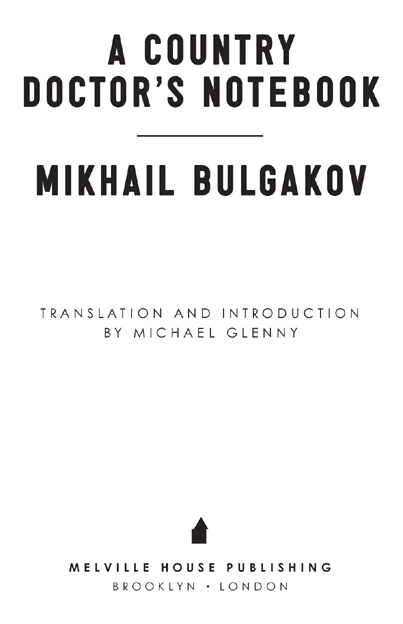A Country Doctor's Notebook
PRAISE FOR
A COUNTRY DOCTOR’S NOTEBOOK
“This book has a freshness and liveliness … an epic quality because of the background of Russia’s vastness, the great distances, the weight of the ignorance, the need.”
—DORIS LESSING
“These straightforward yet extraordinary sketches gain their strength from also being the account of a young man’s growth. One begins to see that he became a novelist not because he had material but because he was storing up passion and temperament.”
—V.S. PRITCHETT, NEW STATESMAN
“Stories as keen and bright as a scalpel … Courage shines from every angle of this profoundly human collection by the greatest of modern Russian writers.”
—SUNDAY TIMES
“Bulgakov casts a wonderfully wry, self-deprecating humour. His compassion for human folly is unfailing … These stories stand testament both to human resilience and a remarkable literary talent.”
—THE INDEPENDENT
A COUNTRY DOCTOR’S NOTEBOOK

MIKHAIL BULGAKOV (1891–1940) was born in Kiev, one of seven children born to a university lecturer and a teacher. Although he showed an early interest in theater and literature, he went on to study medicine at Kiev University, and in the early part of the First World War served as a doctor on the front lines. Twice wounded, he left the service and after recovering—and getting over his subsequent morphine addiction—was appointed provincial physician to Smolensk province in 1916. He detailed this experience in A Country Doctor’s Notebook, but the book went unpublished until years after his death. During the Russian Civil War he served briefly as a physician for the Ukrainian People’s Army, while most of his family emigrated to France and Germany. Bulgakov, however, was refused permission to leave. In 1919 he left medicine to write full-time, settling in Moscow and publishing works such as Heart of a Dog (1925) and The White Guard (1926). Though his work was often censored, Stalin showed his personal favor by protecting him from imprisonment and found work for him at Moscow’s Art Theater. During much of the 1930s Bulgakov worked there as a stage director, while laboring at home on his masterpiece, The Master and Margarita. He finished the book in 1939 but died of a kidney disorder the following year, leaving The Master and Margarita unpublished until twenty-six years after his death.
MICHAEL GLENNY (1927–1990) was one of the world’s leading translators of Russian literature, and famous for bringing dissident writers to the fore, including Aleksandr Solzhenitsyn and Georgi Vladimov. He was the first person to translate Mikhail Bulgakov into English, and his translations remain the definitive editions.

THE NEVERSINK LIBRARY
I was by no means the only reader of books on board the Neversink. Several other sailors were diligent readers, though their studies did not lie in the way of belles-lettres. Their favourite authors were such as you may find at the book-stalls around Fulton Market; they were slightly physiological in their nature. My book experiences on board of the frigate proved an example of a fact which every book-lover must have experienced before me, namely, that though public libraries have an imposing air, and doubtless contain invaluable volumes, yet, somehow, the books that prove most agreeable, grateful, and companionable, are those we pick up by chance here and there; those which seem put into our hands by Providence; those which pretend to little, but abound in much. —HERMAN MELVILLE, WHITE JACKET

A COUNTRY DOCTOR’S NOTEBOOK
(3 )
)
First published posthumously in 1975 by Collins & Harvill, London
© 2013 Melville House Publishing
Translation and translator’s introduction © 1975, 2013, the estate of Michael Glenny
Design by Christopher King
First Melville House printing: December 2012
Melville House Publishing
145 Plymouth Street
Brooklyn, NY 11201
www.mhpbooks.com
The Library of Congress has cataloged the paperback edition of this book as follows:
Bulgakov, Mikhail, 1891-1940.
[Zapiski iunogo vracha. English. 2013]
A country doctor’s notebook / Mikhail Bulgakov; [translated by Michael Glenny].
pages; cm
eISBN: 978-1-61219-191-1
I. Glenny, Michael, translator. II. Title.
PG3476.B78A2 2013
891.78’4203–dc23
2012041223
v3.1
CONTENTS
Cover
About the Author
Epigraph
Title Page
Copyright
INTRODUCTION
by Michael Glenny
A COUNTRY DOCTOR’S NOTEBOOK
The Embroidered Towel
The Steel Windpipe
Black as Egypt’s Night
Baptism by Rotation
The Speckled Rash
The Blizzard
The Vanishing Eye
Morphine
The Murderer
INTRODUCTION
BY MICHAEL GLENNY
There have been several doctor-writers, Russian and English, in recent times—Chekhov, Somerset Maugham and A. J. Cronin are perhaps three of the best known—and with this collection of stories Mikhail Bulgakov is revealed as another writer who gained his earliest and perhaps his deepest insights into human nature through the practice of medicine.
Born in 1891, Mikhail Bulgakov was the eldest of the six children of a professor at Kiev Theological Academy. He studied at Kiev University and qualified in medicine in 1916. After eighteen strenuous months in general practice (the subject-matter of most of this book) he decided to specialise, and set up in Kiev as a venereologist. Another eighteen months or so later, the upheavals of the Civil War caused Bulgakov to move to the Caucasus, where he resolved to give up medicine in favour of writing. One of his brothers, Nikolai Bulgakov, was also a doctor, but whereas Mikhail practised only for a few years, stayed in Russia and died there, Nikolai emigrated to France after the revolution and made a distinguished career in Paris as a cardiologist.
By 1916, despite heavy losses from two years of fighting, the Russian army was only capable of absorbing a marginal increase in manpower. This factor, together with the strain placed on civilian medical resources by mobilisation, meant that Bulgakov and many of his fellow graduates of that year were not conscripted as army doctors.
1 comment